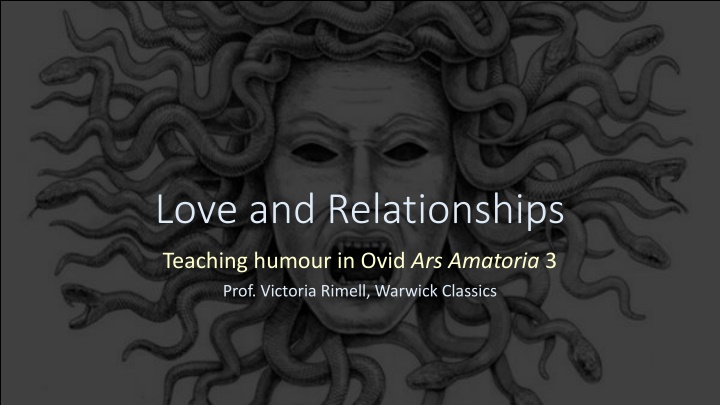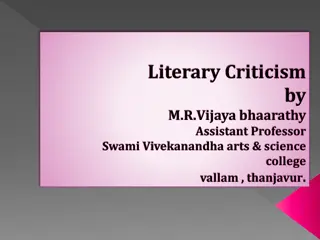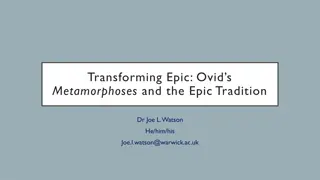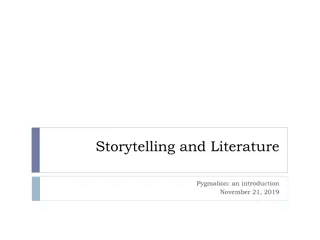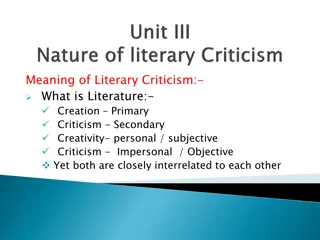The Role of Humour in Ovid's Ars Amatoria: A Literary Analysis
Explore how humour is central to Ovid's works, challenging traditional norms and beliefs through satire and comedy. Delve into the significance of literary devices, language choice, and mythology in conveying Ovid's message to his audience. Unpack the themes of mockery, self-awareness, and social critique present in his erotodidactic poetry.
Download Presentation

Please find below an Image/Link to download the presentation.
The content on the website is provided AS IS for your information and personal use only. It may not be sold, licensed, or shared on other websites without obtaining consent from the author.If you encounter any issues during the download, it is possible that the publisher has removed the file from their server.
You are allowed to download the files provided on this website for personal or commercial use, subject to the condition that they are used lawfully. All files are the property of their respective owners.
The content on the website is provided AS IS for your information and personal use only. It may not be sold, licensed, or shared on other websites without obtaining consent from the author.
E N D
Presentation Transcript
Love and Relationships Teaching humour in Ovid Ars Amatoria 3 Prof. Victoria Rimell, Warwick Classics
The purpose and intended audience of his poetry The social and poetic context including the genre of the work The use of literary devices and choice of language The use of mythology The use of humour Learners should be able to identify and respond to the following:
Humour is not an add-on, or simply an aspect of some parts of the text, but the key to reading Ovid s erotodidactic works/their use of literary devices and language. Framing point 1 [unpack humour : what kinds?] [What does Ovidian elegy mock? Tradition, the pomposity of epic, real men , women ] [Who is laughing at whom?]
Jokes presume knowledge and beliefs; they also reveal and test beliefs. Framing point 2 [What makes us laugh? What happens when the spotlight is turned? Do we get the joke? Are we being made fun of?]
Scorning laughter in ancient philosophy Plato, Republic (388e): the Guardians of the state should avoid laughter, for ordinarily when one abandons himself to violent laughter, his condition provokes a violent reaction. Especially disturbing to Plato were the passages in the Iliad and the Odyssey where Mount Olympus was said to ring with the laughter of the gods. He protested that if anyone represents men of worth as overpowered by laughter we must not accept it, much less if gods. Plato, Philebus (48 50), on the enjoyment of comedy as a form of scorn: Taken generally the ridiculous is a certain kind of evil, specifically a vice. That vice is self-ignorance: the people we laugh at imagine themselves to be wealthier, better looking, or more virtuous than they really are. In laughing at them, we take delight in something evil their self-ignorance and that malice is morally objectionable. In the ideal state, therefore, comedy should be tightly controlled.
Aristotle, Nicomachean Ethics 4.8: such, then, is the man who observes moderation, whether he be called tactful or ready-witted. The buffoon, on the other hand, is the slave of his sense of humour, and spares neither himself nor others if he can raise a laugh, and says things none of which a man of refinement would say, and to some of which he would not even listen. The boor, again, is useless for such social intercourse; for he contributes nothing and finds fault with everything. But relaxation and amusement are thought to be a necessary element in life. Epictetus Enchiridion (33) advises Let not your laughter be loud, frequent, or unrestrained.
Reacting to humour in love elegy is especially self-implicating and risky (for men?), because to enjoy this poetry is already to enjoy a world in which lovers reject traditional male virtue, indulge in vice, and are forced to admit that the art of controlling passion will often fail. Relating this to Ovidian elegy If this stuff makes you laugh, check yourself, look in the mirror
Playing by the rules? Love as art , or passion? You must play the lover . Yet often the actor begins to love for real, and becomes what he has pretended to be Ars 1.611, 615-16
Ars 3.279ff., with Merriam, Latomus 2011 Beyond his description of women s laughter as ugly, crude, animalistic and potentially dangerous, Ovid condemns it still further by offering no remedy by which women s laughter can be made attractive. There are simply no instructions from Ovid on how women can laugh beautifully and this from Ovid, in his book of advice, where he offers tips on everything from walking to the choice of reading matter. [Pp.408-9].
Laugh modestly, a small dimple either side, The teeth mostly concealed by the lips (Ars 3.283-4) Beard 2014, p.158: you could never follow these spuriously technical instructions: that s the joke.
Turning the tables, or a pre-emptive attack? Merriam s conclusion Laughter, rare in elegy, is largely limited to those who are mocking the poet. Specifically, women and gods laugh at the lover, and always from a position of power. Thus women s laughter, besides having the potential to be unattractive, as Ovid emphasizes, also underlines the power dynamic which governs the elegiac world: the gods of elegy (Venus and Cupid) collude with the women to torture the men, and all laugh together at the hapless poet. And so if women can be stopped from laughing through advice on beauty that is through an appeal to their vanity perhaps the power imbalance can be corrected, and the torment will stop. ???!!!!!
(dismantling) male fantasy Merriam, p405: If we regard book three of the Ars as a guide for women on how to fit into the elegiac world, rather than on how to win in love, then the aim of the book and its instructions is much clearer. Women are being taught how to fit into men s fantasies, and thus all the advice given to them is for the benefit of men. And if that makes you angry, puellae, learn to laugh like Medusa [ Look at him looking at you ]
I sing of safe love, permissible intrigue, and there ll be nothing sinful in my song. Now the first task for you, the raw recruit is to find out who you might wish to love. The next task is to make sure that she likes you: the third, to see to it that love will last. (Ars 1.33-38) I ve armed the Greeks against the Amazons: arms remain to give to you, Penthesilea, and your Amazon troop. Go equal to the fight. (Ars 3.1-3)
